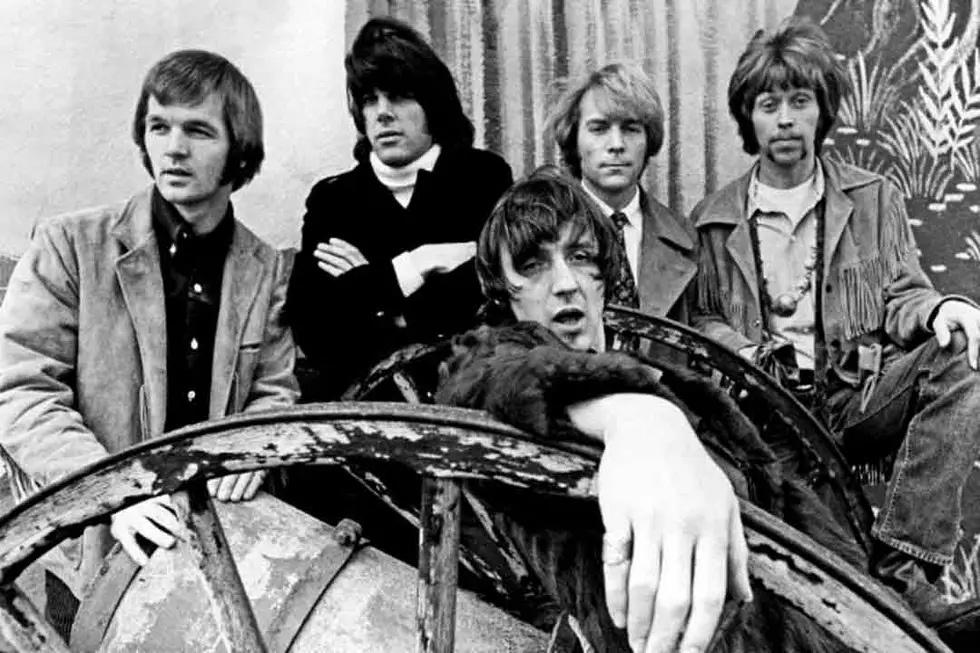
How Moby Grape Rocked San Francisco Scene With Debut LP
Even though Moby Grape’s musical peers were hallowed rock icons like the Grateful Dead, Jefferson Airplane and Janis Joplin, many fans consider the quintet’s debut album to be the pinnacle of the San Francisco ’60s scene. Yet, none of the guys in Moby Grape were even from the Bay Area.
Canadian folk music fan Skip Spence had moved to San Francisco, becoming a part of an early version of Quicksilver Messenger Service before handling drums on Jefferson Airplane’s first LP in 1966, even though guitar was his preferred instrument. After both Spence and manager Matthew Katz were kicked off the Airplane, Katz had the idea to build a band around Spence, who could sing, play and write music. Help came from both north and south.
Guitarist Jerry Miller and drummer Don Stevenson came from the Pacific Northwest, where they had formed the Seattle-based, blues-influenced rock band the Frantics. The two musicians had become permanently waylaid in Frisco after becoming friends with Jerry Garcia. Meanwhile, guitarist Peter Lewis and bassist Bob Mosley came up from Southern California. Lewis, the son of actress Loretta Young, was influenced by country music and played with a finger-picking style. Nelson was an R&B guy, with a husky voice to match the material.
Like Spence, all members could sing, play and write. When the five guys joined forces, they knew they had created something special.
“When we first started rehearsing, it just sounded so good that we said, ‘This is so different from anything I’ve ever experienced,” Miller said in 2016. “Three guitarists … I’ve barely ever played with more than one. It was great. Right then, we knew we had something. We laughed all the way home saying, ‘This is gonna be good’.”
While fellow San Fran bands were looking to get more expansive and jam-oriented, Moby Grape doubled down on their roots. They emphasized elements of folk, blues, R&B and country in their short blasts of rock ’n’ roll. The group had a drive and an energy that made it stand out among local acts.
Listen to Moby Grape's 'Hey Grandma'
“We played into this thing of being punks,” Lewis recalled, according to Team Rock. “With the exception of Skip, we were all club musicians. And club musicians had this kind of subcultural attitude where you pushed everybody around with a sort of controlled foolishness.”
As Moby Grape performed as frequently as possible in the city, their songwriting and trio of guitar players distinguished the band further. Spence would play cutting rhythm, Lewis would finger-pick over that and Miller would go for the scorching lead. At that time, only Buffalo Springfield (who would come up to San Francisco often) could compare. The two bands quickly became mutual admirers.
Before long, a record company bidding war ensued, with Columbia besting Elektra for the right to sign Moby Grape to a contract in February 1967. Part of the reason the band went with Columbia was because the label’s David Rubinson promised to help them get rid of Katz as a manager. A few months earlier, Katz had convinced the members to give him control of the Moby Grape name and their publishing. But, as it turned out, Columbia couldn’t (or didn’t want to) help the band on the business end. The bad deal would plague Moby Grape for decades of their on-and-off existence.
Still, the band was excited to make an album, which it recorded in Los Angeles during March and April 1967, with Rubinson producing. Sessions happened quickly, seeing as Moby Grape had stage-tested the material. The band shared lead vocals among its members, who each received multiple writing credits on the 13-track debut. Songs ranged from driving opener “Hey Grandma” to the soul shaker “Come in the Morning” to the gentle ballad “8:05” (written by Miller about his wife leaving him). Spence’s “Omaha” showcased the Grape’s three-guitar attack, with Spence, Miller and Lewis intertwining as the track hurtled forward.
If the music came easily to Moby Grape, nothing else did. The album cover, featuring a photo of the band in front of a junk shop, caused controversy because of drummer Stevenson’s middle finger on a washboard (later airbrushed out) and an appearance of an American flag behind Spence. When veterans groups complained about these “longhairs” representing the United States, Columbia made alterations.
“They chickened out and took that off and put on an orange flag,” Miller recalled. “And that wasn’t good enough, because they could still see through that, that it was originally an American flag. So then, they made it black. And we were insulted, and still insulted … because we’re Americans too.”
Listen to Moby Grape's 'Omaha'
That wasn’t the only blunder. When Moby Grape was released on June 6, 1967, Columbia held a big release party at San Francisco’s Avalon Ballroom. Journalists from around the country were invited to the shindig, which included 10,000 purple orchids dropping from the ceiling (but causing attendees to slip and fall once on the floor) and hundreds of bottles of “Moby Grape” wine (but no corkscrews).
To make matters worse, three Grapes were arrested for being with underage girls at the end of the night. Even though nothing came of the charges – which the musicians claimed were trumped up – the news damaged the band’s reputation. In addition to bad press and the stink of bad record label hype, Columbia decided to release five singles simultaneously from Moby Grape on the day of the LP’s release.
As a result, radio programmers didn’t know which single to play and a would-be hit like “Omaha” made it to only No. 88 on the Billboard chart. The LP performed better, rising to No. 24 and, supposedly, outselling the Beatles’ legendary Sgt. Pepper’s Lonely Hearts Club Band in the Bay Area.
Although the album would be seen as a missed opportunity (in commercial terms) and Moby Grape would fall apart by the end of the ’60s (with two members diagnosed as schizophrenic), the band’s self-titled debut has grown to be considered one of the best – if not the best – document of San Francisco in 1967.
Not only are rock writers fond on the record (which ranked at No. 121 on Rolling Stone’s list of the 500 greatest albums), but so are musicians. Songs from the album have been covered by the likes of Robert Plant, the Black Crowes, the Move, Cat Power, Bruce Springsteen and Michael Stipe, among others. The surviving members of Moby Grape (everyone but Spence, who died in 1999) speak glowingly of their early glory days.
“It was all just a lot of fun, but hard work too,” Miller remembered. “I mean a lot of stress going in there, hoping you can pull it off just right. … We did. I’m really proud of that first album.”


